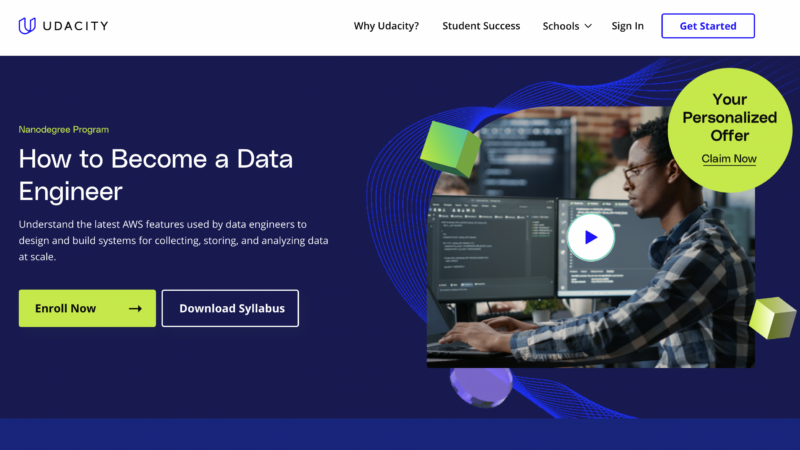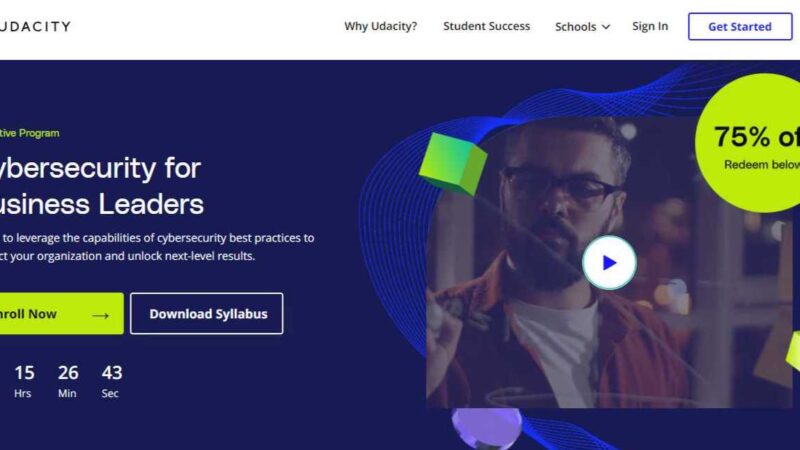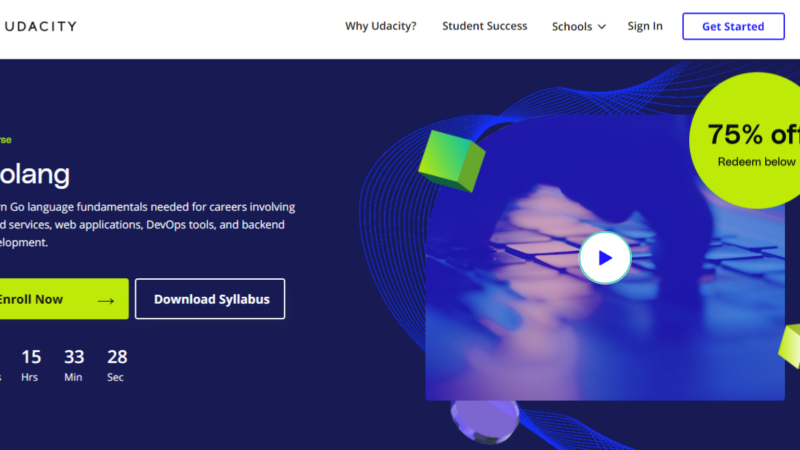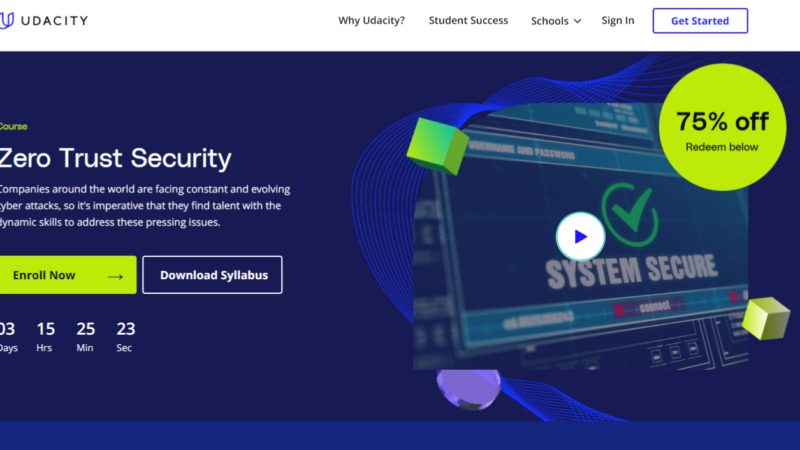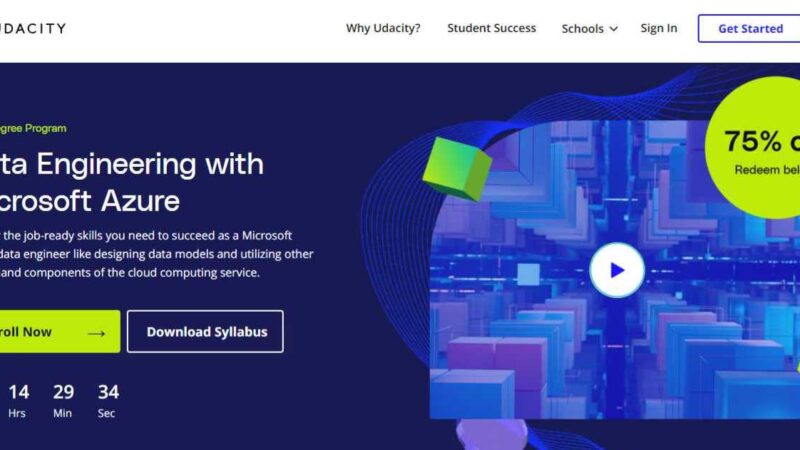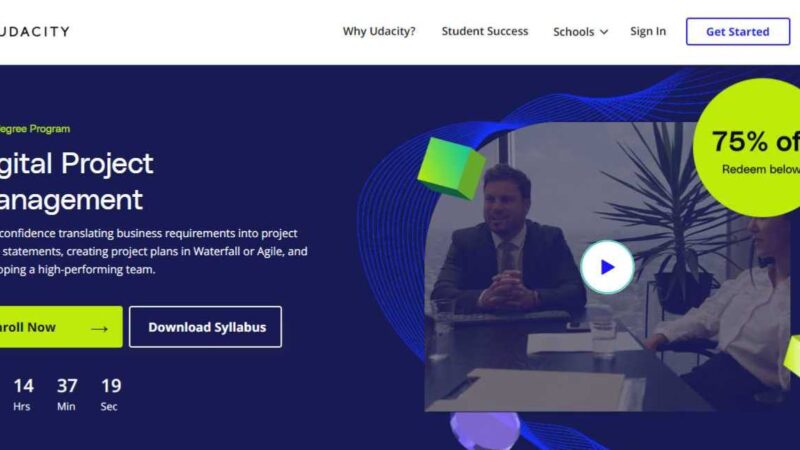Udacity DevOps Engineer for Microsoft Azure Nanodegree Review

DevOps Engineers are in high demand these days, acting as the middle-man between operations and software development. As more and more companies turn to cloud-based solutions to keep them up and running, DevOps professional with the skills to oversee deployment and release secure apps is on the rise. There are a number of skills needed to become a DevOps engineer, most of which you can score in the Become a DevOps Engineer for Microsoft Azure Nanodegree from Udacity.
Now is a better time than ever to start gaining the skills you need and experience to enter into the job market with confidence. In this review, we’ll take a look at the Become a DevOps Engineer for Microsoft Azure Nanodegree curriculum plus the costs and course duration. By the end (or quite possibly before), you’ll have all the information you need to decide whether or not this is the course for you.
About Udacity
Udacity is an online academy that focuses on IT. The idea for this course came from two professors out of Stanford University with the goal of bringing computer science lessons to learners around the world. What started off as a humble idea exploded into a full-range site filled with all things IT. Free entry-level knowledge along with certification courses taught by an amazing list of instructors is now what they are known for, catching the attention of many industry leaders. One of their star features is their nanodegree programs, some of which are created with help from top-tier companies.
What’s a Nanodegree?
A nanodegree from Udacity is an in-depth certification course designed to hone in on one particular topic. Starting from the foundations of a topic, instructors will lead learners along the way teaching through lectures and allowing students to solidify their knowledge with examples. When you sign up for a nanodegree with Udacity, you’re guaranteed:
- A knowledgeable and helpful mentor
- Access to a community of learners
- In-depth curriculum with examples and projects sewn in
- Real industry projects that mimic today’s issues
- Career prep including mock interviews and resume cleanup
- Instruction by some of the industry’s top professionals
Meet your Instructors
To give learners the best possible experience, Udacity searches for instructors with amazing educational and professional backgrounds. Most of them have learned in some of the best schools and worked with top companies in the game. They come with the knowledge to not only teach the curriculum but to also give learners advice. For the Become a DevOps Engineer for Microsoft Azure Nanodegree, your instructors are:
Noah Gift
Noah is an expert in machine learning and artificial intelligence. His foundations were set from his university career with Duke and later with Northwestern. Apart from teaching, he has also written lots of literature about DevOps, including Python for DevOps.
Erick Galikin
Erick is a hacker with a special focus on cybersecurity. He uses artificial intelligence and machine learning to enhance levels of security, using the theory of machine learning. His lectures are engaging and informative, giving learners skills that they can use throughout their lessons and career.
Nathan Anderson
Nathan has a job with Goodyear Tires. He has worked with its system to develop DevOps solutions that increase the security and efficiency of their financial and educational sectors. His experience in the industry with a top-tier company shines through in his lessons, giving learners great tips that they can take along with them as they learn.
Course Breakdown
These days, it is all about the cloud. Businesses are turning to the cloud to help them create more efficient and secure workflows that keep their clients satisfied. One of the most popular platforms used today is Microsoft Azure, which you will learn in this course. You’ll see how to deploy, test, and monitor cloud applications and even get the skills you need to pass the DevOps Engineer certification exam.
Prerequisites
For this course, you’ll already need to have worked with Python. You’ll need to have a good grasp on loops, if/then statements, and functions. Apart from knowledge of Python, before starting the course, you’ll need to create an Azure account and come with at least a basis of how the cloud works and what infrastructures it is capable of creating.
Azure Infrastructure Operations
The DevOps lifecycle is an important part of the process when it comes to cloud infrastructures. In this section, you’ll learn everything from the group up, learning your way around Azure. There is a section about security and deployments, learning about the entire process from start to finish.
Project! Deploy a Web Server
You won’t waste any time putting your skills to work. Using Terraform and Packer, you’ll create an entire infrastructure on your own. The end goal is to make a balanced web server, one that you can use as a foundation for cloud-based applications.
Agile Development with Azure
This section includes a sharp focus on continuous integration. Learn about open source code and tools that allow you to test at different points in the development cycle. You’ll also get a glimpse of the CI/CD pipeline using Azure. This will help you along the process of building and deploying.
Project! Build a CI/CD Pipeline
CI/CD pipelines are important for creating user-friendly and efficient customer experiences. Using the knowledge gained from this section, you’ll build your very own CI/CD pipeline using Azure. Use the pipeline you built to deploy applications that have been tested and are ready to go.
Ensuring Quality Releasees (Quality Assurance)
One of the last things that must be done before applications are finalized is testing. You have to make sure that everything is up and running smoothly before the final deployment. You’ll test the performance of these applications as well as build and construct a way to constantly and continuously monitor the security and overall performance of cloud-based applications.
Project! Ensure a Quality Release
Here, you’ll work with learning industry monitoring tools. Create pipelines that test environments automatically, ensuring that your applications are safe and running like a well-oiled machine. In the end, you’ll analyze your findings, able to point out weaknesses in development, and pointing out the exact cause to better secure your application and your system.
How Long Does the Course Take?
The course is three sections long with a project at the end of each. Throughout the entirety, you’ll gain the skills needed to jump into the field confidently, landing a job faster than you might imagine. You might be thinking this takes forever to complete but, that is not the case. As a matter of fact, Udacity estimates that the course will take three months to complete, even if you’re only dedicating about 5 to 10 hours per week. Not too shabby, right?
You can take advantage of Udacity’s self-paced learning, taking as long as you need to complete the course. There are two things you’ll need to watch out for when taking your time, one is project deadlines and the other is the cost. More on that in the next section.
How Much Does the Course Cost?
An important question you might have is, so what’s this going to cost me? Udacity’s motto is affordable education but, how do they rank? Well, that depends. They offer a few ways to pay, attempting to cater to learners of all backgrounds. Udacity’s options to pay to include:
Udacity’s ‘Bundle and Save’ Deal
With this deal, you’re taking Udacity’s recommended time to complete the course. The way it works is, you pay up from for the entire recommended time, scoring a 15% discount along with it. Taking this route, you’re looking at a one-time fee of $927. This includes three months of access plus all of the Udacity perks for the entire course. This is a great way to go if you have limited time on your hands and agree with Udacity’s estimate. If you want to save a bit, you could choose the second option but, you’ll need to go at a faster pace.
Pay Per Month
When you pay per month, you’re receiving access one month at a time. In this way, you’re not getting a discount but, could possibly finish faster than what Udacity estimates. Going this route, you’re looking at $359 per month. This can be a better deal but only if you’re able to finish within two months. If you get the hang of things and can finish in just one month, you’ve got yourself a great deal! If not, you may be better off taking the bundle deal and relaxing along your learning journey.
What Have Learners Said?
Udacity has an overall positive rating, scoring 4.5 out of 5 stars from many of the top-ranking IT course review sites. As far as this course, learners have thoroughly enjoyed it, giving it a 4.6 out of 5 stars. Here is what a few had to say.
“I am very pleased with the content structure, very well organized, and work perfectly on a linear education path. The course is very informative and the practical part is rich and the projects force us to learn more and search for answers.” – Obai S.
“The curriculum structure is great. I think it’s encouraging. I like the habit of 30 days of Udacity. Though I don’t read all emails/messages from the social media staff member, I read at least half of them, which is uplifting that humans are behind the scenes cheering us all on. I liked the Slack channel that was in my DSND in 2018. I use the chat channel and it is quite good, but still tricky to navigate regularly. The integration with Facebook is a great idea!” – Mark C.
“It was the best online course I have been part of, Thank you udacity for such amazing content. They provide the best tutors and also very good job support.” -Nilay
What’s the Job Market Like?
Just like many sectors in the world of IT, DevOps is in demand. As more applications move to a cloud-based way of development, those with the skills to build and deploy cloud-based applications and assure their security become a huge asset. The thing is, there are not many who have the skills necessary, and there seems to be less every year. That is good news for you, giving you lots of room to move up as you advance your skills. A recent analysis showed that the job market is hot and that demand is expected to increase by 26% within the next few years.
Landing a job as a DevOps engineer, you could work with large names in the industry, building up your knowledge base, and becoming a huge asset. Another attractive feature that comes with the title is the higher average salary, which is around $92,000 annually. This does not include bonuses and promotions that are typical in the field, making it a very profitable skill to have. Landing a job is easier than you might think, especially since popular portals for the job hunt report an increase in job postings for the year 2019 and 2020.
What Are You Waiting For?
DevOps is a crucial part of the development process when it comes to applications. Those with the skills to execute DevOps using Microsoft Azure are in high demand, and this is only expected to increase. With the Become a DevOps Engineer for Microsoft Azure Nanodegree from Udacity, you could set your foundation in just three months or less. On top of learning the skills needed to break into the field, you’ll score perks that help you land your first job.
The curriculum, the instructors, and Udacity’s reputation are all great, leaving no doubts when it comes to making your decision. The only thing left to think about is which payment option you want to choose and when you’re ready to start. A career in one of the hottest fields in IT could be yours, and all it takes is just a few clicks and a quick sign up to begin.
